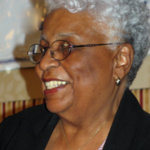Interviewer: Chris Petersen
Interview Date: May 30, 2012
Location: St. Philip the Deacon Episcopal Church, Portland, Oregon
Duration: 1:03:27
Boozer discusses the multiethnic neighborhood she grew up in Northeast Portland, the significant places people in the community would gather at, how her family hosted black entertainers from out of town, such as Lionel Hampton. She describes her time in school at the challenges she faced in high school. She details the day of the Vanport Flood, what she saw, what she heard and how the community reacted. How she met her husband and her wedding day. She then discusses her involvement in civil rights in the 60s, public demonstrations in Oregon, Freedom Riders, the ongoing Civil Rights Movement in Oregon, names main figures of the Civil Rights movement in Portland, her thoughts on national Civil Rights activists such as Malcolm X, Dr. King and the Black Panthers. She discusses her feelings on the last draft board and "Project Return." Boozer explains her time at the Seminary, the transition from the Seminary to becoming a Reverend, her experience being Vicar of Emmanuel Missions in Birkenfeld and St. Philip the Deacon Episcopal Church, the changing demographic of St. Philip. Afterwards, she goes into details about past reverends, Ramsey Schadewitz, Karl Reich, Sally Lambert, and Richard Green. She concludes the interview by explaining the difficulty she had leaving the church when she retired, how the church is connected to the Urban League of Portland, and her thoughts her own life and what she has accomplished.
Reverend Alcena Elaine Boozer (b.1938), was the Rector of the St. Philip the Deacon Parish for 17 years. Following the completion of her seminary training in the 1980s, she was one of the first women ordained in the Diocese of Oregon and one of only three African American women ordained in the Episcopal Church nationally.
Dublin Core
Title
Description
Reverend Alcena Elaine Boozer (b.1938), was the Rector of the St. Philip the Deacon Parish for 17 years. Following the completion of her seminary training in the 1980s, she was one of the first women ordained in the Diocese of Oregon and one of only three African American women ordained in the Episcopal Church nationally.

